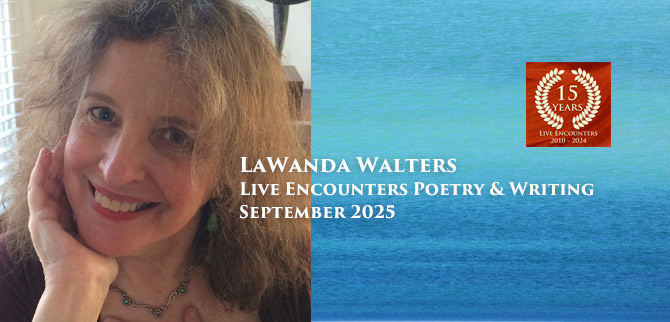
Live Encounters Poetry & Writing September 2025
On Not Finding Ozon’s Film, poems by LaWanda Walters.
On Not Finding Ozon’s Film
Certain times don’t feel conducive
to composing a poem or sonata
or doing anything, frankly,
and so we want to find François Ozon’s
Swimming Pool on Netflix.
We want the one from 2003,
with Charlotte Rampling.
We get a different film—
La Piscine, with Alain Delon—
that’s overdone and hackneyed.
We wanted the pure thing of it,
the blue water and its cool
in the bright sunlight
on an ochre lawn.
The pool was an alluring character—
it lay in the sun like a nude,
like a sapphire or a Diebenkorn.
It was an experience to see it.
It evoked some mystery,
like a boxwood maze.
We weren’t just watching—
we were in it.
That’s what we wanted, today,
a calm blue bath in sunlight,
the sound of the French language
against crude English words
thrown like spitballs in these mean times.
Cornfield
One time, I might have been in the seventh
grade, I was out with my dad and other men,
my granddaddy and great-uncle Ted,
looking at the new cornfield he’d just bought.
Uncle Ted wore a cowboy hat like Gene Autry,
and I’d thought of him as handsome and nice
enough, one of those old uncles you have to hug,
when you see them, to be polite.
I hadn’t really wanted to come look at this place,
which was dusty—all dead cornstalks and dirt.
Not a cloud in the sky. This was Mississippi.
It was hot. I was wearing white shorts so I couldn’t
Uncle Ted looked at me and said, “I bet you weigh
a heap more than your pa, dontcha?”
I could feel my face get red. I weighed 135,
but I was tall, like my dad.
I felt like my face got slapped.
I’d thought adults never said things like that.
Inside, he was like the seventh-grade boys
in the school cafeteria, folding their upper eyelids backwards
so they stuck, showing the red inner lid
to gross people out, to shock.
I remembered how pretty his grandchild was. Marlene
had blonde hair with no frizz. She was just the right size.
I’d been a child before we went to see that field.
Now I’d been looked at, weighed up in that man’s mind
like a bag of salt. We were two bodies, my father and I,
both of us shaped wrong for the world.
My dad and I felt awkward, riding home.
I knew, and he knew, that a father
shouldn’t hear another man speak to his kid
like that. He’d shamed us both, somehow,
about our bodies. My sweaty legs stuck to the seat.
It may have been about then
that my father started getting angry with me.
I was skinny except I had big hips.
Counterpoint
Against every reference to the beach
and summer entertainment, we hear
(if we’re still able) the contrapuntal
news. There are two wars, and lots
of people like us are dead now
in Ukraine, in Israel, in Gaza.
All it takes to know is to gaze
for a second at the news. We turn Bach
on loud, try to drown our minds’ knowing
so immediately how war is. We hear
too much about the concert, how lots
got raped with guns. And the counterpoint,
babies in Palestine with no counterpane
to dream on, ever. Their open-eyed gaze
so soon. The counterpoint is why Lot’s
wife looked back. The ads for beaches
are ear-splitting now so we cannot hear
those children crying, either. We know
too much in today’s blue light that knows
so many cruelties—the world is pain
and all those decibels hurt our hearing.
The news shows us Ukraine, Israel, and Gaza,
then breaks to an ad—vacations on the beach.
There was no TV in the time of Lot’s
wife. She remembered throwing lots
(like mahjong) with her friends. She knew
these women. She’d bathed with them at beaches
in other days. She did not forget the pain
of worry, of not being chosen, married, rescued, gazed
upon and recognized. Against God’s law, she heard
the terrified voices—like my sister with perfect pitch, who heard
every key pushed down by an arm, a parlor trick, the whole lot
of notes crammed together. Ukraine, Israel, and Gaza—
their worlds smashed, but paused by ads on TV so we don’t know
more than we can handle. In case of sunburn pain,
there’s aloe-vera balm when you leave the beach.
Once I read Eyeless in Gaza on the beach
at Lake Lanier. I was young and didn’t know the pain
the woman (that old salt) heard, seeing her lot.
© LaWanda Walters
LaWanda Walters earned her M.F.A. from Indiana University, where she won the Academy of American Poets Prize. Her first book of poems, Light Is the Odalisque, was published in 2016 by Press 53 in its Silver Concho Poetry Series. Her poems have appeared in Poetry, Georgia Review, Southern Review, Nine Mile, Antioch Review, Cincinnati Review, Ploughshares, Shenandoah, and several anthologies, including Best American Poetry 2015, Obsession: Sestinas in the Twenty-First Century, and I Wanna Be Loved by You: Poems on Marilyn Monroe. She received Ohio Arts Council Individual Excellence Awards in 2020 and 2024. She lives in Cincinnati with her husband, poet John Philip Drury.

